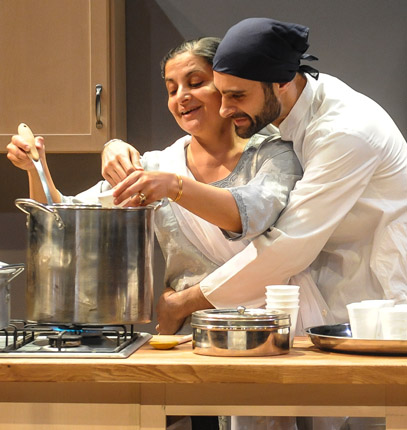Khandan (Family) is an exploration of extended family and the values that Indian traditions hold in modern day Britain. The play introduces us to the Gill family as Jeeto’s son, Pal, sells the family business to start his own venture and struggles to live up to his father’s legacy. What follows is family bickering and, of course, countless cups of “chah”.
The sentimental widow, Jeeto mourns her late husband and the sacrifices they made for the sake of their children. Pal makes his big business plans as his wife laments their failure to conceive a child and the arrival of their cousin’s destitute wife, Reema, shakes the family’s world upside down.
The intimate space of The Studio at The Rep really lends itself to this production, we feel as if we are sat in the house observing the action as it unfolds. The cosy set design helps the production, complete with a working sink, hob and fully carpeted it creates a very homely feel – however the use of the projections on the windows at the rear of the space is often more a minor distraction, despite the fact it covers up the scene changes effectively.
The cast all perform admirably with the stand-out performance coming from Sudha Bhuchar who is fierce and bold as the matriarchal mother. Her dominant and sentimental personality is really allowed to shine as we watch her trying desperately to cling onto everything she has build for her family.
RADA trained Lauren Crace is excellent as the seemingly out of place, not too bright but charming Liz and Preeya Kalidas gives a compelling and accomplished performance as Reema. Rez Kempton exhibits the pressure talking its toll on his character Pal and Neil D’Souza offers some lightness to the performance as Major alongside Zita Sattar as Cookie.
The direction from Roxana Silbert is tight and the play has some wonderfully light, humorous and also quite tender moments. However, although effective in parts, some of the jokes rely a little too much on the Punjabi language and cultural references and fly straight over the shoulder of a portion of the audience.
At times towards the end of the first act we do get the feeling that the plot needs to advance somewhat. However, our patience is rewarded after the interval and the pace then does not drop until the end of the performance.
The play is booked to play at the Royal Court in London after its Birmingham run and one feels this is fitting for such a well crafted little play.
All in all Khandan is a delightfully warm play with plenty of charm about it. ★★★★☆ Sam Chipman



